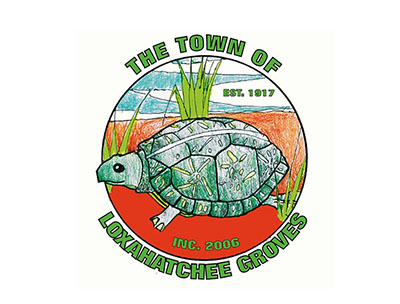The Loxahatchee Groves Town Council held its first public hearing on the budget for fiscal year 2021-22 on Wednesday, Sept. 8, adopting the previous year’s tax rate of 3 mills unchanged, and a slightly higher budget due to increased property values.
The council also adopted a non-ad valorem assessment of $200 per acre and a solid waste disposal rate of $450 per residence for the year. The tax rate is 6.45 percent higher than the rollback rate of 2.82 mills.
“Our valuation rates were certified in late June at $388,826,388, which is what calculates the ad valorem revenue for the fiscal year 2021-22 budget,” Town Manager Jamie Titcomb said. “The proposed rate at 3 mills is the same as it was in fiscal year 2020-21 and was the preliminary rate you adopted for the TRIM [Truth in Millage] at the July 26 meeting. It’s the same rate as the prior year as well. While we are still operating on the assumption of a 3-mill assessment, it’s technically an increase because the property valuation of the town increased.”
The proposed budget for all funds totals $5.2 million excluding transfers between funds, and maintains existing levels of service, Titcomb said, explaining that the council held joint budget workshops with the Finance Advisory & Audit Committee on Aug. 9, 16 and 23 to discuss aspects of the proposed operating and capital budgets.
“Tonight’s meeting is the first public hearing on the proposed budget and the corresponding millage rates,” Titcomb said. “There will be a second public hearing and final adoption hearing, which is to be held on Tuesday, Sept. 21.”
He explained that by law, the budget’s revenues in and expenses out must be balanced.
Assistant Town Manager Francine Ramaglia said the $5.2 million budget has remained largely the same for the past four years, since the public works function was adopted by the town, adding that the millage rate has also remained the same during that time.
“Everything has stayed the same in terms of the total numbers for the last four years,” Ramaglia said. “The biggest changes are how the numbers have shifted, so no more management company, now town staff.”
She added that the town has projects that were completed this year, including catch basin and overlay programs.
“Now we have programs that we need to decide on how we’d like to complete them this year,” Ramaglia said.
During the council/FAAC workshops, the group came up with a number of revenue pursuits for the town to follow in the coming year, including water use permits, restructuring the solid waste contract and looking at possible revenue producing ordinances more closely, which she said is underway.
“We are also looking at our code enforcement, not necessarily for making it a revenue generator, but to go ahead and pursue fines more aggressively because we have not done that so much in the past,” Ramaglia said.
She added that at the workshops, there was conversation about impact and user fees.
“We talked about [how] there would need to be a capital plan by statute, and we would need to have a user fee analysis,” Ramaglia said, adding that the Treasure Coast Regional Planning Council could help the town with a mobility plan that could be crafted with a user fee in mind.
“The expense cuts were a bit more difficult, but we still got there,” she said. “The first directive was to cut $150,000 of expenses to close the gap, and we pretty much did that, and we moved those cuts into the CIP fund This year’s capital improvement fund has about $398,000 available. Last year’s had $350,000 available in CIP funding.”
While the town has allocated and mostly spent the sales surtax monies collected to date, there will be another $250,000 to $260,000 collected next year, which can be used for continued capital investments.
“This year, we will have the benefit of receiving the ARPA [American Rescue Plan Act] funds as a non-entitlement city. We are getting $1.4 million over the next two years, about $700,000 a year, but it’s use is governed by having a plan,” Ramaglia said, adding that drainage projects might qualify for ARPA funding.
Staff reduced engineering expenses at the direction of the council, and they are beginning conversations with the Palm Beach County Sheriff’s Office about reducing its contract.
“We have removed the lobbyist fees as previously discussed, but that does not mean that we would not be able to do something on a per-project basis if we needed to do something with grants,” Ramaglia said, adding that there is $25,000 in the budget that might go to the TCRPC’s work on the town’s comprehensive plan. After the council discussed a few particular line items in the budget, the millage rate, budget, non-valorem assessment and solid waste fee were all approved unanimously.








